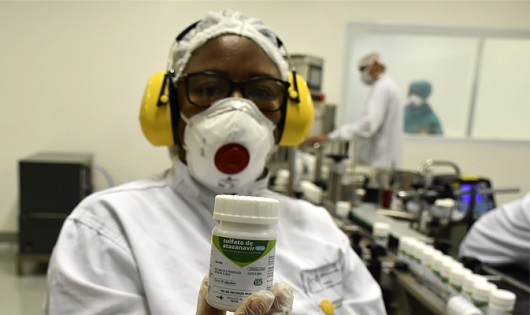Fiocruz concludes Atazanavir technological absorption
18/06/2020
Alexandre Matos (Farmanguinhos/Fiocruz)
The Institute of Drug Technology (Farmanguinhos/Fiocruz) concluded, in early June, the manufacture of Atazanavir pilot batches, an antiretroviral used to treat thousands of people living with HIV/AIDS. Public production was made possible by a technology transfer agreement from the American laboratory Bristol Myers Squibb to the Fiocruz unit through a Productive Development Partnership (PDP).

The drug is used by thousands of people living with HIV/Aids in Brazil (photo: Farmanguinhos/Fiocruz)
Thus, this stage aimed to include Farmanguinhos/Fiocruz as a manufacturing site by the National Health Surveillance Agency (Anvisa). The forecast is that, in the second half of this year, the Institute will be executing the entire Atazanavir production process at the Technological Medicines Complex (CTM) facilities, located in Rio de Janeiro (RJ).
Strengthening the national industry
Brazil is the 6th pharmaceutical market in the world, according to a survey by IQVIA, behind only the United States, China, Japan, Germany and France. However, despite the prominent position, the country still suffers from dependence on imported health supplies, which generates a deficit in the health sector.
According to the director of Farmanguinhos/Fiocruz, Jorge Mendonça, one of the PDP's strategies to reduce this trade imbalance is to also internalize the production of the Active Pharmaceutical Ingredient (IFA), the medication main substance, responsible for the therapeutic effect. In this sense, three batches were produced with IFA imported from the partner Bristol Myers Squibb and one batch for inclusion of a national manufacturer. In this case, Nortec is the Brazilian partner to produce the Atazanavir IFA.
“Farmanguinhos is a Ministry of Health strategic branch and has played a leading role in this policy of strengthening this fundamental sector for Brazilian public health. The PDP covers the drug entire production process, including the IFA on national soil manufacture. In this way, we reduce the country's dependence on imported supplies and, consequently, we contribute to the trade balance, thus helping our Public Health System (SUS) sustainability ”, observes the director.
Mendonça also points out that strengthening the national pharmaceutical industry generates jobs and country income, including in highly qualified area like this. “In addition, our main goal is to guarantee the supply of the Brazilian Public Health System with these essential drugs for patients, as well as expanding treatment,” he says.
Strategic performance
This role of Farmanguinhos/Fiocruz is possible because the unit has the Technological Drugs Complex (CTM), an industrial plant with more than 2 billion pharmaceutical units production capacity per year.
In the case of antiretrovirals, Farmanguinhos plays a strategic role in the success of the policy of universal access to these drugs. The first made in the country was zidovudine, in 1999. Over the last two decades, the institutional portfolio has been expanded to offer first-line treatments to patients. Currently, the Institute has registration of seven antiretrovirals. One of them is Atazanavir 300 mg, which belongs to the protease inhibitors class, that is, it blocks the protease enzyme action, preventing the production of new copies of HIV-infected cells. The drug is part of the Clinical Protocol and Therapeutic Guidelines for the Management of HIV Infection in Adults (PCDT/MS). To get an idea of the relevance that public production represents, the internal demand is more than 33 million pharmaceutical units for this year.
Technological benefits
The coordinator of the team that manages the technological absorption process, Abel Alves, explains the benefits of cooperation for the Institute. “We acquired all the technology and the drug production knowledge, both in manufacturing and in other processes involved in technological absorption. The areas absorb some part of the drug process and this experience remains at the institution. Knowledge, equipment, processes, all this is absorbed technology that remains”, he observes.
The pharmacist highlights the internal effort and that of the partner companies to achieve the results. “Farmanguinhos has managed to continue with this work even during the pandemic and all its challenges. Absorbing technologies is an extremely challenging job, involves many people, there are many surprises along the way and the teams participating in the project have concentrated all efforts to make it happen, ”says Abel Alves.
Technological absorption involves the entire unit, but some areas have a more direct participation, among which, Quality Control and Quality Assurance; the Technological Development Laboratories (Pharmaceutical Technology, Solid State Study, and Analytical Development and Validation); the Warehouse and the Workplace Safety and Environmental Management Center, which elaborate a specific routine according to the technology acquired by the institution.


